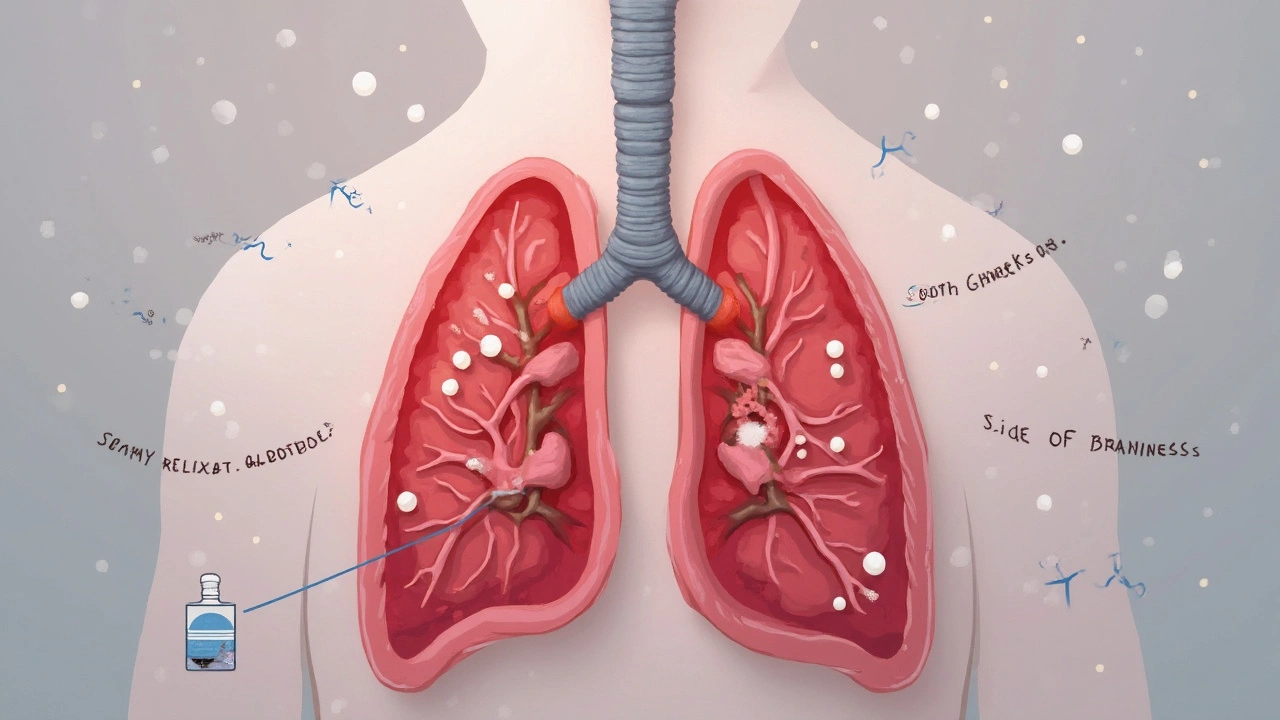If you’ve ever struggled to catch your breath in the middle of an asthma attack, you know that calm and clear airways feel priceless. An albuterol inhaler is one of those things you don’t really think about—until you need it. It’s often the go-to rescue tool people with asthma rely on for quick relief.
Most folks know albuterol works fast, but not everyone gets how it actually helps. Pop quiz: Do you know why some people get shaky hands or a racing heart after a couple of puffs? Or why doctors keep reminding you not to overuse it, even if it seems like magic in a can? These questions matter, because how you use an inhaler can make a real difference in your day-to-day breathing and long-term health.
We’re going to bust through the technical jargon and make sense of what’s really happening in your chest when you use albuterol. If you’ve always just reached for your inhaler and hoped for the best, you might be surprised how much easier life can get with a few smart tweaks to your routine.
- Asthma and the Basics of Breathing Trouble
- Albuterol’s Role: What Actually Happens in Your Lungs
- How to Use an Inhaler for Best Results
- Quick Facts and Surprising Tips
- When to Seek More Than Just the Inhaler
Asthma and the Basics of Breathing Trouble
Asthma isn’t just about “wheezing”—it’s a real condition where your airways tighten up, get swollen, and sometimes spew out extra mucus. That combo makes it tough for air to move in or out, so you end up short of breath, coughing, or even gasping for air. The thing is, this can hit anyone: kids, adults, athletes, even folks who are otherwise healthy.
When you’re hit with an asthma attack, the muscles around your airways clamp down—kind of like a fist squeezing a straw. Then, the inside lining gets puffy and more mucus adds to the blockage. This is why you might feel like you can’t get a deep breath, or your chest feels tight.
Some common asthma triggers include:
- Allergens like dust mites, pollen, or pet hair
- Cold air or sudden weather changes
- Exercise, especially in cold weather
- Strong scents (like perfumes or cleaning sprays)
- Smoke or air pollution
- Respiratory infections (like colds or flu)
According to the CDC, about 1 in 13 people in the U.S. has asthma. That means if there's a class of 26 kids, it’s likely two of them are grabbing their asthma inhaler out of their backpack at some point during the school year.
An important thing to know? Asthma doesn’t go away, but you can manage it. That’s where medications like albuterol step in. Understanding what’s going on inside your body when symptoms flare up is the first step to keeping those scary episodes at bay.
Albuterol’s Role: What Actually Happens in Your Lungs
So, you hit your albuterol inhaler during an asthma attack—what does that little blast actually do? At its core, albuterol is a medicine that tells the muscles wrapped around your airways (the tubes that carry air in and out of your lungs) to relax. When you’re having an asthma flare, those muscles squeeze tight and narrow the airways. That’s why breathing gets tough.
Once the albuterol mist gets into your lungs, it acts fast. It sticks to special spots on those airway muscles called beta-2 receptors. Picture them like little light switches—when albuterol flips them on, the muscles loosen up. Suddenly, the airways get wider and, within minutes, you can breathe easier. That’s why asthma relief from an inhaler feels almost instant to many people.
Here’s a quick look at what changes inside your lungs:
- Airways relax and open up
- Less chest tightness and wheezing
- Coughing often calms down
- Breathing feels less like sucking air through a straw
But the story doesn’t stop there. Because albuterol acts on beta-2 receptors, it can also sneak into your bloodstream—causing those famous side effects like shaky hands and a quickened heartbeat. That’s totally normal, but it’s a big reason why experts say to only use your inhaler as directed.
Think of albuterol as emergency help, not a daily fix. If you’re reaching for it more than twice a week, it’s time for a talk with your doctor about better long-term control.
| How Fast Does Albuterol Work? | Usual Duration of Relief |
|---|---|
| 2 to 5 minutes after inhaling | 4 to 6 hours |
Bottom line: Albuterol inhalers give your lungs a break when they’re tied up in knots. Used the right way, they bring quick asthma relief—which is huge, especially when you need to get back to living your life.

How to Use an Inhaler for Best Results
A albuterol inhaler might look simple, but using it wrong can mean you’re missing out on the relief it’s supposed to give. Way more people mess up inhaler technique than you’d think—some studies say over 70% don’t get the full dose into their lungs. Getting it right is about more than just pressing and breathing.
Here’s what you actually need to do for best results:
- Shake the inhaler well. Ten seconds is good. This gets the medicine mixed evenly.
- Breathe out big and slow, away from the inhaler. Empty lungs work best here.
- Seal your lips firmly around the mouthpiece. No space for that medicine to leak out.
- As you start to breathe in, press the canister down once for a puff. Try to breathe in deeply and slowly at the SAME time.
- Hold your breath for about 10 seconds so your albuterol can settle deep in your airways.
- Then breathe out gently. If you need a second puff, wait 30 seconds and repeat.
Using a spacer (a simple plastic tube you attach before the mouthpiece) can make a big difference. It helps the medicine get all the way to your lungs, not just stuck at the back of your mouth. Kids, older adults, and honestly, anyone who finds the timing stressful, should ask a doctor about spacers.
Here’s a quick look at how technique affects medication delivery:
| Technique | Medicine reaching lungs |
|---|---|
| Perfect timing (with spacer) | Up to 60% |
| Without spacer | Around 20%-30% |
| Poor timing or missed steps | <10% |
It sounds obvious but the inhaler clock matters: check the dose counter or mark it when you get a new asthma inhaler. Running out in the middle of an attack is a nightmare you don’t want. Also, always rinse your mouth after using the inhaler; it helps with that weird taste and prevents irritation.
If you feel like you’re not getting as much relief as you used to, don’t just keep puffing away. Ask your doctor to check your inhaler technique and make sure everything’s on track with your asthma relief plan.
Quick Facts and Surprising Tips
Here’s where things get interesting. Most people think a albuterol inhaler is all about just taking a puff and feeling better. There’s actually more you should know if you want the best asthma relief, the fewest side effects, and a smoother ride with your lungs.
- Fast Acting: Albuterol usually kicks in within five minutes. That’s why it’s called a rescue inhaler. If you’re still wheezing after ten minutes and your inhaler isn’t helping, it might be time for medical attention.
- Common Side Effects: Shaky hands, a quickened heartbeat, and a bit of nervousness are all pretty normal after using a asthma inhaler. These effects usually fade away in less than an hour.
- Don’t Overdo It: Overusing your albuterol inhaler can actually make asthma worse in the long run. If you’re using it more than twice a week (except for exercise), check with your doctor. You might need a different asthma plan.
- Use a Spacer: About 50% of asthma inhaler users don’t get the full dose into their lungs. A spacer (that plastic tube attachment) makes a big difference, helping you get more medicine where it needs to go—and less stuck in your mouth and throat.
- Keep Track: Modern inhalers sometimes come with counters. Watching your puff count can keep you from running out at the worst time. No counter? Mark your calendar each time you get a new one, or stick a simple reminder on your phone.
| Fact | What It Means for You |
|---|---|
| Albuterol relaxes airway muscles | Faster, easier breathing during asthma attacks |
| Effects last 4–6 hours | Still, you shouldn’t rely on it all day—get help if you need frequent doses |
| 2 puffs is a standard dose | Taking more doesn’t mean extra relief, just extra risk for side effects |
Here’s a practical tip: Shake the inhaler before every use. And rinse your mouth afterward when you can. This cuts down the risk for infections and helps keep the taste from sticking around.
Finally, always have your albuterol inhaler within reach—whether it’s in your backpack, nightstand, or even your car’s cupholder. Don’t leave it somewhere you have to dig for it in an emergency. Keeping it nearby can make all the difference.

When to Seek More Than Just the Inhaler
Sometimes a albuterol inhaler isn’t enough. If you find yourself grabbing your inhaler more often than usual, that’s a signal your asthma might be getting out of hand. Doctors usually suggest if you’re using your rescue inhaler (like albuterol) more than twice a week (outside of exercise), it’s time to check in with your doctor. This isn’t just being cautious—it’s a sign your airways are staying inflamed, and you might need something beyond quick-fix relief.
Some situations mean you shouldn’t mess around. If you experience any of these, get help right away:
- Your inhaler isn’t helping after a few minutes, or you need multiple uses just to breathe okay.
- You’re wheezing, coughing, or struggling for air even at rest.
- Your lips or fingertips look bluish.
- You have trouble walking or talking because you’re so breathless.
Here’s a simple table that can help you spot red flags:
| Warning Sign | What to Do |
|---|---|
| Needing albuterol more than twice a week | Talk to your doctor |
| Inhaler not helping after a few minutes | Call emergency services |
| Bluish lips or nails | Get emergency help immediately |
| Waking up at night with asthma symptoms | See your doctor soon |
Using a asthma inhaler for rescue is meant for the occasional flare-up, not something you lean on every day. Overusing it can actually mask how out-of-control your asthma is. If that little canister is empty all the time, or you feel stuck in a cycle of relief and return symptoms, you’re overdue for a better strategy. This might mean daily preventer meds, allergy control, or an updated asthma action plan. No shame in asking for help—the goal is to breathe easy, not just survive each day.



Gary Smith
July 18 2025Alright folks, let's get this straight—albuterol inhalers are absolute lifesavers when it comes to asthma relief! Some people underestimate them but they act fast—I mean really fast—to open up those constricted airways and let you breathe easy again!!
What blows my mind is how this tiny device delivers medication direct to your lungs in seconds. It's not just some magic trick; it's serious science at play. And yeah, that jittery feeling afterward? That's just your body's way of reacting to the adrenaline rush pumped out by the drug.
Seriously though, don’t ignore your inhaler instructions—proper technique can make or break how well it works. And for those who rely on it daily, keep an eye out for overuse because it can lead to diminished effect and even make symptoms worse!
Anyone else notice the difference between disk inhalers and those puffer-types? I find the disk goes down smoother for me. Curious what y’all think on this! In the end, understanding these gadgets means taking power over your asthma rather than letting it control you!
Sarah DeMaranville
July 18 2025Honestly, people make too much fuss about albuterol inhalers. They’re not miracle drugs, just hype shoved down everyone's throat. The science isn’t groundbreaking, it’s basic stuff we've known for decades. And that jittery side effect? I mean, if you ask me, it’s barely worth mentioning, but hey, everyone acts like it’s some big deal.
Most folks don’t even use the inhaler properly which causes all those issues anyway. Instead of idolizing these devices, why not focus on better preventative care and overall health methodologies? But sure, keep relying on your quick fixes with these puffers. It's the modern way, I guess.
Also, this whole article seems more about comforting rather than educating—typical sensationalism. I’d like to see more nuanced discussions than this surface-level puff piece.
Travis Evans
July 19 2025Hey everyone! Just chiming in to say this article really nails it on how albuterol works in those clammy moments when breathing gets tough. Those jitters can be annoying for sure, but they’re a small trade-off for instant relief. I always remind people to breathe in deeply, hold that breath, and give the medication time to do its magic.
One tip I picked up over time: always have a spacer if the inhaler bothers your throat, it really smooths out the delivery and can prevent that scratchy feeling or cough. Also, never wait too long in an attack!! The quicker you act, the better the outcome.
I can’t stress enough how empowering it feels to understand your health routine deeply — like you’re in control, not asthma. Big shoutout to anyone dealing with it daily: you got this!!
Dominic Dale
July 19 2025Guys, wake up! You think albuterol inhalers are some straightforward miracle drug? There’s so much more going on behind the curtain. Ever considered how pharmaceutical companies push these inhalers so aggressively, making us dependent on them while hiding potential long-term side effects?
That jittery feeling? It’s your body signaling stress responses that could actually be harmful when repeated frequently. Why isn’t anyone talking about natural remedies or preventing the triggers instead of pumping chemicals into your lungs? We’re being conditioned to accept quick fixes rather than questioning the system itself.
Look deeper, question the motive, demand transparency!! This article is just another cog in the pharma machine's propaganda. Stay vigilant, folks.
Jessica Hakizimana
July 20 2025This piece is quite enlightening and genuinely helpful for folks navigating asthma. Knowing exactly what’s happening in your lungs during an attack and how albuterol acts to alleviate that tightness can be both comforting and empowering.
I love that it addresses the jittery side effect openly – transparency is vital so people aren’t caught off guard or worried needlessly. We often undervalue the power of understanding our medications beyond names and dosages.
For anyone reading this who lives with asthma or supports someone who does, remember that knowledge paired with mindfulness makes managing asthma a shared journey rather than a lonely struggle. Keep learning, stay hopeful, and lean on community support whenever you can!
Patrick Price
July 21 2025Dude this article’s cool n all but gotta say, sometimes they make it all too neat and simple ya know? Like, it’s not just about understanding the puff or how it opens your lungs — sometimes you gotta think about what else you’re putting in your body or how you’re feeling. Side effects go beyond jitters for some peeps.
Also, do they mention how storage and climate can screw with the inhaler’s effectiveness? Cuz I’ve seen mine act weird when I travel or if I leave it somewhere hot. Small stuff but can mean a big difference when you’re counting on it!
Anyway, good read overall — just wish they’d throw in more tips for real-life mishaps and what to do if your inhaler isn’t working quite right.
Keyla Garcia
July 21 2025OMG, this article got me like 😱 It’s wild how something so tiny can save your breath and your life but also mess with your nerves afterward 🙄 Who knew?! It totally explains the jittery shakes I get — makes me feel less crazy tho lol 😅
But seriously, why doesn’t every doctor spill this stuff plain and simple?? Like, just tell us why it’s happening without all the medical mumbo jumbo. I swear, sometimes it feels like they want to keep us guessing.
Anyway, props for breaking it down — way easier to understand than some of those videos that just confuse me more 🤷♀️
Edward Leger
July 23 2025Reflecting on this article, it raises a thought-provoking question about how our body’s chemistry reacts so dynamically to medication. The interplay between the immediate relief and the physical side effects speaks to a fundamental balance our physiology attempts to maintain.
It’s quite remarkable how albuterol targets the bronchial muscles specifically, yet this targeted action cascades into systemic influences that manifest as jitters. This duality reminds me of the philosophical tension between remedy and consequence, a microcosm of medical intervention itself.
For those seeking to understand not just the 'how' but the 'why' behind their treatment, this article can be a valuable gateway to deeper inquiry and mindfulness about one’s health journey.
peter derks
July 24 2025Definitely a helpful read here! One thing I always emphasize to folks using albuterol inhalers is consistency in using them correctly. You’d be surprised how many people just don’t get the timing right or forget to hold their breath long enough after using it.
Technique is everything to maximize its effect. Plus, keeping track of how many puffs you’re actually taking matters – you don’t want to be caught short when you most need it. I usually suggest folks to mark down doses or use apps for reminders.
Also, important to remember: albuterol works best as an emergency relief, not a long-term control med. If you find yourself needing it often, get proper medical advice ASAP! Asthma control is a marathon, not a sprint.
Matthew Holmes
July 25 2025Look the whole fuss about albuterol acting as a quick fix for asthma symptoms reeks of deeper conspiracies. Why does this drug have to cause that jittery side effect that almost feels like your body's warning sign? Are we really being helped or are we trapped in a cycle of dependence promoted by unseen forces?
That quick relief could mask worsening conditions — how many people think they’re okay but are actually spiraling down because they trust a puff of this stuff? It’s like a big pharmaceutical coverup right under our noses, playing mind games with our very breath!
Wake up people before the cure becomes the curse.
Ismaeel Ishaaq
July 28 2025Great article! I appreciate the clear explanation about how albuterol works and why you sometimes feel jittery after using it. In my country, asthma care is often misunderstood, so posts like this are super valuable and eye-opening to many.
My question is, are there any affordable alternatives or supplements that can support lung function alongside albuterol? Sometimes, access to inhalers isn’t consistent, and having additional options would be a lifesaver for many.
Also, does anyone have tips for dealing with the jitteriness without compromising the effectiveness of treatment? Would love to hear your experiences and advice on that.